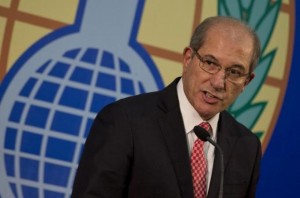 The leader of the global monitoring group that is helping oversee the eradication of Syria’s chemical weapons arsenal raised the strong possibility on Monday of a delay in the timetable, saying it would be “quite difficult” to meet a deadline three weeks from now for transporting the most dangerous materials out of the country by sea.
The leader of the global monitoring group that is helping oversee the eradication of Syria’s chemical weapons arsenal raised the strong possibility on Monday of a delay in the timetable, saying it would be “quite difficult” to meet a deadline three weeks from now for transporting the most dangerous materials out of the country by sea.
Such a delay, broached by Ahmet Uzumcu, the director general of the Organization for the Prohibition of Chemical Weapons ( OPCW), would be the first in the timetable of the eradication program, which began more than two months ago and is considered so far to be an extraordinary and conspicuous success in a country at war.
Mr. Uzumcu spoke less than a week after the United Nations official in charge of coordinating the eradication program, Sigrid Kaag, told the Security Council that transporting the most dangerous cargo overland to the Syrian port of Latakia for export and destruction, as envisioned in the plan, would be quite dangerous because the roads were unsafe. Ms. Kaag said Syrian military forces were trying to secure them.
Chemical weapons experts have determined that the Syrian arsenal, which includes more than 1,000 tons of munitions like sarin, mustard gas and other toxic substances, must be transported using roads linking Damascus and other areas to Latakia, a Mediterranean port that is a government stronghold. But the roads traverse rebel-controlled areas.
“In view of the circumstances in this country, it will be quite difficult to meet this timeline,” Mr. Uzumcu was quoted by news services as saying at a news conference in Oslo. He was in Norway to accept the 2013 Nobel Peace Prize on behalf of his organization at a ceremony on Tuesday.
Under the timeline for destruction of the weapons and the materials used to create them, the “most critical” chemicals are to be transported out of Syria by Dec. 31, other chemical substances and precursors must be removed by Feb. 5, all chemical weapons facilities must be destroyed by March 2014, and the entire arsenal must be destroyed “in the safest and soonest manner” no later than June 30.
Mr. Uzumcu told reporters in Oslo that the most dangerous chemicals might have to be exported from Latakia in early January. He expressed confidence that “the deadline of the end of June next year will be met.”
He spoke as Syria’s state-run news media asserted that the army had taken control of one highway connecting Damascus to the coast. A senior Foreign Ministry official in Russia, which helped arrange the agreement in which Syria pledged to surrender its chemical weapons, said the Russians were willing to help transport the chemicals to Latakia. “This issue is being discussed,” the Voice of Russia radio service quoted the official, the deputy foreign minister Mikhail Bogdanov, as saying.
Ms. Kaag said last week that the chemicals would be transported from Latakia to an unspecified foreign port, where they would be transferred to a United States naval vessel capable of rendering the chemicals harmless at sea.
NY Times

Leave a Reply
You must be logged in to post a comment.